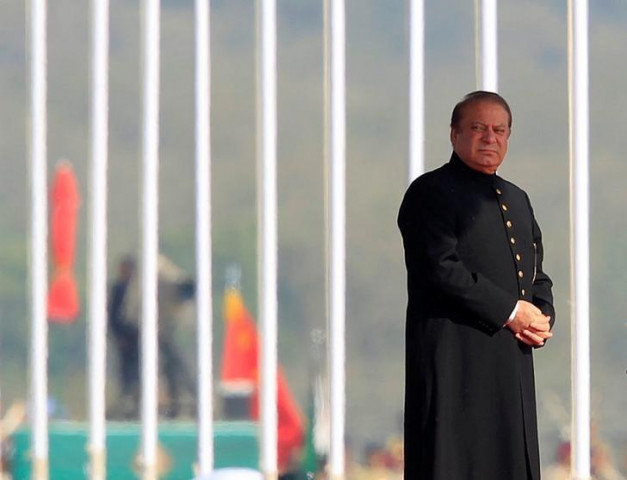Asset or not – debate continues as review petition readied
Sharifs’ lawyers believe SC bench did not consider relevant provisions and previous judgments relevant to the...

REUTERS/Faisal Mahmood/Files
The Sharif family’s legal team is still stunned over the unanimous verdict by a five-judge bench whereby Nawaz Sharif was disqualified as member of the National Assembly.
A member of the legal team believes that the court did not properly hear the Nawaz’s salary issue. According to him, the bench’s entire focus was on the alleged illegal offshore business of the family, but it disqualified Sharif on something that was not raised by in the petitions.
Panamagate saga ends: Prime Minister sent packing
The PML-N lawyers believe that the judgment was authored in haste and the bench did not consider relevant provisions as well as previous judgments relevant to the matter, adding that the bench only relied on Black’s law dictionary while defining ‘assets’.
They also wondered why the Supreme Court did not consider the Income Tax Ordinance 2001 to interpret the word ‘salary’, which was not defined in The Representation of People Act (ROPA) of 1976.
Section 12 of the Ordinance states: “Salary means any amount received by an employee from any employment, whether of a revenue or capital nature”.
It is learnt that the Sharif family lawyers will raise this point in the review petition likely to be filed on Monday (tomorrow).
However, a section of lawyers differs with this interpretation, contending that Section 12 should be read with Section 69(c) of the Income Tax Ordinance 2001, which states that a person shall be treated as having received an amount, benefit or perquisite if it is made available to the person.
They believe that in view of this provision, salary was available for Nawaz, therefore it should have been declared as asset.
Former vice chairman of the Pakistan Bar Council Dr Farogh Nasim believes that legally, the judgment is correct, adding that the Sharif family adopted the doctrine of ‘Piercing the Corporate Veil’.
Hearing concludes: Judgment reserved in Panamagate case
He says that the top court may now disqualify any parliamentarian under Article 184(3) of the Constitution on concealment of assets in nomination papers.
Legal experts believe that SC judges’ views widely diverged on the applicability of Article 62(1)(f) of the Constitution.
In his minority judgment, Justice Asif Saeed Khosa declared that provisions of Articles 62 and 63 be applied to the public conduct of a person affecting others rather than his private conduct not affecting the general populace.
These constitutional provisions deal with the moral conduct of an individual.
Under Article 62(1)(f), a person can be qualified as member of the National Assembly or provincial assemblies, if he is not ‘Sadiq and Ameen’
Justice Khosa relied on Justice Qazi Faez Isa’s judgment, who, as the Chief Justice of the Balochistan High Court, interpreted how Article 62 (1) (f) should be applied.
Justice Gulzar Ahmad also agrees to this view.
These three judges will be future chief justices of Pakistan.
“If honesty in public office holders is a moral issue then one needs not be apologetic about enforcing such a constitutional obligation and if the people start ignoring the moral prerequisites in public life, there would be no better forum than courts to insist upon the values and ethos of the Constitution. We must not forget that the so-called moral provisions of Articles 62 and 63 of the Constitution are meant to be enforced even against those who claim to have popular support or who have already demonstrated their popular endorsement and, thus, popular support or endorsement of the person concerned has absolutely nothing to do with enforcement of those provisions of the Constitution”, says Justice Khosa in his dissenting note.
However, three judges in the Panamagate case differed with Justice Khosa’s view and they held that violation of legal obligation or breach of law was necessary for applicability of Article 62(1)(f) of the Constitution.
Justice Azmat Saeed Sheikh, who was among these three judges, says that Article 62(1)(f) of the Constitution cannot be permitted to be used as a tool for political engineering by the court, nor should the court grant itself the power to vet candidates on moral grounds, like a Council of Elders as is done in a neighbouring country.
“Under our Constitutional dispensation, Pakistan is to be governed by representatives chosen by the people and not chosen by any institution or individuals.”
Legal experts say that these three judges’ views on the applicability of Article 62(1)(f) would serve as a precedent in future.
On the basis of the same principle, the bench in its July 28 Oder disqualified Nawaz as member of the National Assembly.
Lawyers, however, expect that the three-judge bench, headed by Chief Justice Mian Saqib Nisar, will also interpret Article 62(1)(f) in the Hanif Abbasi case.



1724319076-0/Untitled-design-(5)1724319076-0-208x130.webp)















COMMENTS
Comments are moderated and generally will be posted if they are on-topic and not abusive.
For more information, please see our Comments FAQ